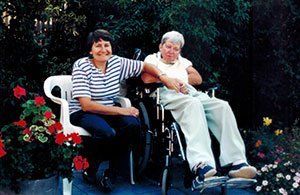We Planted an Apricot Tree
We planted the apricot tree in our garden in May 1998, a symbol of life’s continuation for us. Sue, my partner, was soon to go into hospital for a tracheotomy. A procedure that was going to help with suctioning secretions from her compromised lungs. Sue had Multiple Sclerosis and was regularly getting aspiration pneumonia. Her body was dying. She was not ready to go. She still had too much living to do. Along with swallowing problems she could not speak so all our communication was via her head nodding in response to questions with yes or no answers.
Sue survived the surgery and that summer and fall we watched the apricot tree grow and eventually as winter came, the leaves drop off. Sue died at the end of March 1999. I went into the garden to look at our tree of life. I found the winter had harmed not one branch and buds abounded. Later in April there was a memorial service at our church for Sue. I placed forsythia boughs from the garden in a vase at the spot where she, in her wheelchair, had sat so many Sundays. The Apricot tree was in full bloom.
I will always remember that day when I walked to the tree. The late afternoon sun back lit the fragile blossoms which seemed to radiate light. Its glowing energy, its vibrating frequencies seemed to melt into me, to connect. This was my first sense of a “physical” connection to Sue after her death. It seemed the tree was talking to me. My tears at that moment I think were of joy. Our tree lived on; a channel was opened.
I’m not used to growing fruit trees but I did learn that one had to remove many of the fruit the first year to maintain strength in the tree. I think I counted 100. The next summer I wanted a big harvest, however the raccoons in the night seemed to beat me to the prize. I vowed the following year to protect the tree from climbing raccoons. As I had more time to spend on my garden I designed a patio in the area behind the apricot tree.
My mind is hazy as to when things started changing. But one year the bark started splitting and breaking, allowing insects to enter. There were some blossoms but no fruit formed. The branches still grew and I was pruning about 4 feet a year. But it was dying. Our tree of life was dying. This was a great stress. I associated the tree with Sue. Was she telling me I had to let go of the past? I am sure I was still holding on. I was supposed to let go, move on. I could not deny that this was the truth. Would there be other messages for me in metaphor and symbolism?
Branches started dying, but at the same time suckers were growing around the trunk. Ultimately I decided to nurture three suckers. They grew tall and strong. For a couple of years I let them grow up around the now leafless original tree. I would decorate its stark branches with glass balls and ornaments.
Finally in the spring of 2007 I snapped the old tree off at its base, the three suckers were branching out and now 15 feet tall. I had let go of the old memory and had embraced the new. The transformation of both the tree and me was complete. I had moved on.












